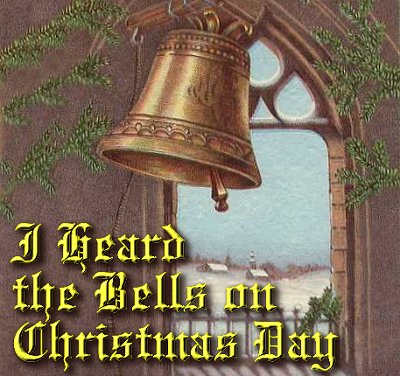 Yesterday morning, I attended Trinity Lutheran Church with my family, and Pastor Virgil Cain gave a brief yet excellent meditation drawing from a poem-turned-into-a-hymn penned in 1863 by Henry Wadsworth Longfellow (1807-1882), a great poet and literary scholar, titled “I Heard the Bells on Christmas Day.” As I listened to the pastor, my heart was encouraged and comforted by his message and I had to share this poem with you.
Yesterday morning, I attended Trinity Lutheran Church with my family, and Pastor Virgil Cain gave a brief yet excellent meditation drawing from a poem-turned-into-a-hymn penned in 1863 by Henry Wadsworth Longfellow (1807-1882), a great poet and literary scholar, titled “I Heard the Bells on Christmas Day.” As I listened to the pastor, my heart was encouraged and comforted by his message and I had to share this poem with you.In order to understand the background of this hymn, a very brief history must be given about Henry Longfellow (very brief, I promise!). He was married to Fannie Elizabeth Appleton, and both of them had, among three other children, a son named Charles Appleton Longfellow on June 9, 1844 in Cambridge, Massachusetts. In 1861, Mrs. Longfellow died in a tragic fire in their house, and American Civil War broke out the same year. The seventeen-year-old Charles Longfellow joined Mr. Lincoln’s army in March 1863 and was severely injured in November by a bullet that traveled across his back, nicked his spine, and exited under his right shoulder (he missed being paralyzed by one inch!). After bringing Charles from Washington D.C. to Cambridge, Henry Longfellow as a single parent nursed Charles slowly back to health, and Charles survived but never returned to combat. On Christmas Day of 1863, six months after the infamous Battle of Gettysburg where 40,000 people were killed in three days and while Charles was healing from his wartime injury, Henry sat at a desk and composed a seven-stanza poem while the church bells continually pealed in the background.
Henry Longfellow composed this rime during one of the darkest chapters of his life. In the light of his wife’s tragic death, the outbreak of the American Civil War, and the future of his son’s life in question, there was not much hope for Henry to hold onto. The fear and uncertainty he faced on the Christmas Day of 1863 could probably paralyze the strongest man or render him impotent (if not only me!). Yet Henry refused to let his grief crush his spirit and cause him to lose hope. One can’t help but pause and wonder: what is the source of his strength, comfort, and hope in the face of such an incredible pain and sorrow?
In contrast to Nietzsche, the eminent poet knew one thing was certain: God was not dead. The source of Henry Longfellow’s strength, comfort, and hope was found only in Jesus Christ, the One who has conquered pain and death through his resurrection and victory over sin and death (John 16:33; 1 John 5:3-4). Henry depended on Christ as his solid rock, able to weather through any storms of this lifetime. People were moved by his poem, and it was tuned into a carol nine years later by John Baptiste Calkin, an English organist and composer, and is now one of the most treasured Christmas hymns in America.
The words of this poem have brought great comfort and peace to me because this world is full of uncertainty, despair, rumors of war, moral debauchery, and rampant unemployment. Henry Longfellow’s heartfelt words flourished from the seeds of profound grief and heart wrenching sorrow, and the poem serves as a constant reminder to everyone that hope, joy, love, and peace is found in Christ alone.
My friends, I pray that you will not miss what I am saying here. True hope, unbounded joy, unconditional love, and lasting peace is found only when you place your complete faith and trust in the person and work of Jesus Christ. You see, I am not being a "closed-minded" person when I say this; I write this with a heart full of love and concern for your souls. Jesus came on earth to bring forgiveness, joy, hope, redemption, and a promise of new life to the mankind in the face of sin, sorrow, despair, damnation, and death. The Christ child was the greatest gift from God that was opened on Easter morning. Easter wouldn't happen without Christmas. The cross and an empty tomb would be meaningless without the cradle.
Do you hear the Christmas bells that still ring across this land?
-----------
I heard the bells on Christmas Day
Their old familiar carols play,
And wild and sweet
The words repeat
Of peace on earth, good-will to men!
And thought how, as the day had come,
The belfries of all Christendom
Had rolled along
The unbroken song
Of peace on earth, good-will to men!
Till, ringing, singing on its way,The world revolved from night to day,
A voice, a chime,
A chant sublime
Of peace on earth, good-will to men!
Then from each black, accursed mouthThe cannon thundered in the South,
And with the sound
The carols drowned
Of peace on earth, good-will to men!
It was as if an earthquake rentThe hearth-stones of a continent,
And made forlorn
The households born
Of peace on earth, good-will to men!
And in despair I bowed my head;"There is no peace on earth," I said,
"For hate is strong,
And mocks the song
Of peace on earth, good will to men!"
Then pealed the bells more loud and deep;God is not dead; nor doth he sleep!
The Wrong shall fail,
The Right prevail,
With peace on earth, good-will to men!
No comments:
Post a Comment